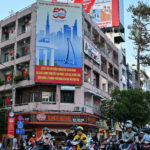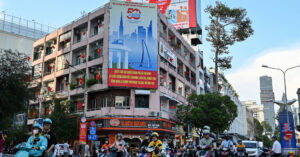The Trump administration, reversing a policy that angered Vietnam veterans, has eased a ban on senior American diplomats attending events for the 50th anniversary of the end of the Vietnam War.
On Tuesday, the United States informed Vietnamese officials that Susan Burns, the U.S. Consul General, would attend a reception on Tuesday night with other diplomats and Vietnamese officials. Witnesses reported seeing her at the event, which was held at a hotel in Ho Chi Minh City, and one shared a photo with The Times.
Marc E. Knapper — the U.S. ambassador and son of a Vietnam veteran — was not seen with Ms. Burns, though he had previously planned to represent the United States.
Mr. Knapper is also not expected at the main event, which includes a parade and speeches on Wednesday, the actual anniversary of South Vietnam’s surrender and the American evacuation from what was then Saigon on April 30, 1975.
Critics of the attendance ban welcomed Ms. Burns’ presence, but insisted it was not enough. They said that the Trump administration had already shown a lack of understanding about the importance of postwar reconciliation with a country that is now a strategic partner in efforts to counter China’s influence across the region.
“From where I sit, they don’t have a clue,” said John Terzano, a founder of the Vietnam Veterans of America Foundation, who has been returning to Vietnam since 1981.
He said that the United States had bumbled into the war and stayed too long because leaders at the time, like Defense Secretary Robert McNamara, saw Vietnam only through the lens of arrogance or parochial interests. Washington was now at risk of making similar mistakes, he added.
“The ambassador is not here,” Mr. Terzano said. “And the symbolic nature of that matters.”
The Trump administration did not give a reason for the ban, though some U.S. officials speculated that the White House did not want to be seen as celebrating an anniversary of defeat around the 100th day of Mr. Trump’s second term.
Analysts noted that the United States and Vietnam had elevated their ties in 2023 to a comprehensive strategic partnership as a step forward — not because of the war or a hunger for reconciliation, but rather because of urgent shared interests, which can transcend diplomatic squabbles.
“The U.S. values its closer ties with Vietnam because of its strategic competition with China, while Vietnam hopes its closer ties with the U.S. will greatly help its quest for security and prosperity,” said Alexander Vuving, a professor at the Asia-Pacific Center for Security Studies in Honolulu.
Few countries in Asia are more hostile to China than Vietnam is. Vietnam’s people see their national identity as embedded in their resistance to dominance from Beijing. As China’s southern neighbor and former colony, Vietnam has frequent disputes with China over territory in the South China Sea, even as it welcomes Chinese investment.
Roughly 30 percent of Vietnam’s exports went to the United States last year, producing a large trade imbalance. But China is Vietnam’s largest trading partner, and Mr. Trump’s tariffs and his destruction of U.S.A.I.D. have shaken Vietnam’s bond with the United States. U.S.A.I.D. recently suspended funding for removing land mines left behind from the war, and the cleanup of Agent Orange, an herbicide that causes cancer and birth defects.
Vietnam’s goal has long been balanced relations with great powers.
In an essay published on Sunday in the state news media, To Lam, Vietnam’s top leader and the general secretary of the Communist Party, stressed the power of personal reconciliation among former enemies.
“I have witnessed many moving encounters between Vietnamese veterans and American veterans — those who once stood on opposing sides of the battlefield, who once confronted each other at gunpoint, but who can now shake hands, converse and share sincere understanding without lingering resentment,” he wrote. “Today, Vietnam and the United States — once former adversaries — have become comprehensive strategic partners, cooperating for peace, for the benefit of both peoples, and for the security and stability of the region.”
Yet Xi Jinping, China’s leader, who recently visited Hanoi, Vietnam’s capital, and the Trump administration have each warned Vietnam not to support the other.
The American ambassador’s absence at the 50th anniversary commemorations may now be seen as another attempt to pressure Vietnam into compliance.
“For many Vietnamese, the message is: ‘You have to choose,’” Mr. Vuving said. “For some others, the message is ‘Vietnam’s Communist regime is incompatible with a U.S. partnership.’”
Ms. Burns is expected at a parade for the anniversary on Wednesday, according to two people with knowledge of the U.S. confirmation that was sent to Vietnamese officials.
The State Department and the U.S. Embassy in Hanoi did not respond to requests for comment.
Tung Ngo contributed reporting.











More Stories
How Photography From the Vietnam War Changed America
A Russian Missile Blew Apart These Kyiv Apartments, and a Decades-Old Community
Clashes Erupt in Damascus Outskirts, Killing 9